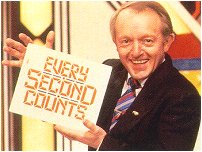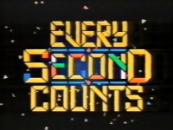Every Second Counts
(→Synopsis) |
(→Synopsis) |
||
| Line 43: | Line 43: | ||
After the first half, the two players in each team swap round so the person that was in the back seat is now playing in the driving seat. What's more, they double the points so a good answer nets four seconds. This being the sexist 80s, nearly always the men played in round 2. | After the first half, the two players in each team swap round so the person that was in the back seat is now playing in the driving seat. What's more, they double the points so a good answer nets four seconds. This being the sexist 80s, nearly always the men played in round 2. | ||
| - | The team with the most time are the winners and go through to the final. The losers win some ''Every Second Counts'' executive sunglasses. Not really of course, they win a "lovely" clock. | + | The team with the most time are the winners and go through to the final. The losers win some ''Every Second Counts'' executive sunglasses. Not really of course, they win a "lovely" clock (and also his and her's watches in later series). |
The winners, in a fit of cleverness, carry through the time they've earned into the final round. They'd get a choice of two categories, and the statements for each category would have three possibilities, such as: ''"All these words can be preceded by the words bat, market or blue"''. The players would take it in turns to respond to the statements. If they get one correct, one of the lights in front of them goes out. If they get them all out they win that prize and the clock is stopped. Except they can then improve on their prize by answering a different set of questions. Four lights for the first prize up, five, six and then seven for the obligatory African safari holiday. If, by the time they get to seven lights, it's obvious they don't have enough time to do it they'd be given £50 for every second left because, y' know, ''Every Second Counts''. | The winners, in a fit of cleverness, carry through the time they've earned into the final round. They'd get a choice of two categories, and the statements for each category would have three possibilities, such as: ''"All these words can be preceded by the words bat, market or blue"''. The players would take it in turns to respond to the statements. If they get one correct, one of the lights in front of them goes out. If they get them all out they win that prize and the clock is stopped. Except they can then improve on their prize by answering a different set of questions. Four lights for the first prize up, five, six and then seven for the obligatory African safari holiday. If, by the time they get to seven lights, it's obvious they don't have enough time to do it they'd be given £50 for every second left because, y' know, ''Every Second Counts''. | ||
Revision as of 16:21, 6 September 2007
Contents |
Hosts
Larry Grayson (pilot, unaired)
Russell Grant (pilot, unaired)
Broadcast
BBC1, 8 February 1986 to 29 October 1993 (142 programmes in 9 series)
Synopsis
This show was noticeable for several things. It was a show that lasted ever such a long time, or at least it felt that way. Then there's the gloriously dated use of an LCD-display font. And there's Teesside funster Paul Daniels at the helm, helping three couples to clock up time for the final round where they could win a consumer durable or a holiday (but not both, mind).
The basic format: in the first round, one contestant from each couple sits in the "driving seat", while their partner can't say anything but pulls faces in the vain hope that their beloved gets the answer right. For the question read out, two possible options are given, and the contestants in the driving seats would in turn respond to those statements one way or the other, normally very stupidly.
Made-up example: "Famous Twigs."
Paul: Q. Which of these are famous twigs? Say "Twiggo!" if they are or "Twig Off!" if not. We'll begin with "Twiggy".
Contestant 1: "Twiggo!" (Ding!)
Paul: "Twig of the Dump".
Contestant 2: "Twiggo!" (duh-dum!)
Paul: "No, you daft ha'peth, it was Stig of the Dump."
Contestant 2 is now out of the round so that the remaining two players can keep answering and earn some extra time. Each correct answer in the first half of the show earns two seconds. Bonus points should have been given for making the contestants wear funny hats during some of the rounds but weren't.
A silly twiddly jingle after a couple of rounds denotes a bonus round. Here the couple with the fewest seconds on their clock gets first pick of one of three categories, normally general knowledge, pop music, food and drink, that sort of thing, Paul would read out the question, usually one with many possible wrong answers such as "What was The Beatles' first No 1 single?" and both members of the team would reel off as much as they can until they hit on the right answer. If they hit it straight off they get ten seconds added to their score, otherwise the amount of time left when (if) they get it right is added to their score.
 Paul Daniels, host of Every Second Counts
Paul Daniels, host of Every Second CountsAfter the first half, the two players in each team swap round so the person that was in the back seat is now playing in the driving seat. What's more, they double the points so a good answer nets four seconds. This being the sexist 80s, nearly always the men played in round 2.
The team with the most time are the winners and go through to the final. The losers win some Every Second Counts executive sunglasses. Not really of course, they win a "lovely" clock (and also his and her's watches in later series).
The winners, in a fit of cleverness, carry through the time they've earned into the final round. They'd get a choice of two categories, and the statements for each category would have three possibilities, such as: "All these words can be preceded by the words bat, market or blue". The players would take it in turns to respond to the statements. If they get one correct, one of the lights in front of them goes out. If they get them all out they win that prize and the clock is stopped. Except they can then improve on their prize by answering a different set of questions. Four lights for the first prize up, five, six and then seven for the obligatory African safari holiday. If, by the time they get to seven lights, it's obvious they don't have enough time to do it they'd be given £50 for every second left because, y' know, Every Second Counts.
Overall, an enjoyable and easy-to-play-along-with show that fitted in well in the Saturday evening schedule, helped along by Daniels' professionalism and cheerful bonhomie with the contestants. Indeed, he was an excellent host for all three game shows that he hosted for the BBC (the other two being Odd One Out and Wipeout) - he certainly deserves to be remembered as much for his game show hosting as for his magic!
Key moments
The three-part punctuated zoom on the entrance doorway during the titles while the voice-over goes "And here's your host for Every... Second... Counts - Pauuul Daniels!"
There was an amusing episode once when the display panel for one of the teams fell off during recording...
Paul Daniels sometimes used to bring out props for the contestants to use as part of their answers. These included talking cuddly parrots that would (deliberately, no doubt) keep talking when they shouldn't have! Similar gimmicks were also occasionally used in Wipeout once Paul had moved onto that show.
During an extra twiddly bit in the closing credits theme music, Paul would wave "Goodbye" very cheesily at the camera (compare and contrast with the Les Dennis "See Ya" in the modern Family Fortunes, history buffs).
Theme music
John Mealing on top form for this show.
Trivia
Point of confusion: the contestants always got the 4-light prize and the highest prize they'd achieved, but not the prizes in-between.
One of the "warm-up" men on the programme, a Mr Bruce Thompson, once appeared as a one-man-band on Opportunity Knocks. He's still doing his one-man-band act on cruise ships to this day.


